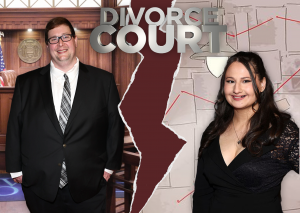Undressing, eyes shut, taking a step, waiting for the results. It felt like a lifetime before I was brought back to reality by a loud starting beep. Looking down, the number revealed itself: 160.7.
While the progress was evident, it wasn’t enough. I had only managed to lose a pound from the night before, with only two days left to reach my goal of losing 10 pounds that week.
“Two more days without eating,” I told myself. “No problem.”
I chose to starve.
Growing up, my whole life has been about food; specifically, a fear of it. When I was nine, I would wait in angst for my mother to tell me what we were going to be having for dinner. Terrified, it was all I could think about throughout the day. When food was served at lunch, I didn’t eat it. I would bring my own that I either gave away or pitched. At night, I would sit at the dinner table for hours. I wasn’t allowed to leave until it was all gone. I would gag up any food I ingested as I slowly snuck the rest to my dog.
One night, my father burst into tears. He begged me to come to the table and eat. He was always worried. He wanted to make sure I was getting the nutrition I needed.
Forced to pick between my fear of food and him, I stuck to my fears. I chose to starve.
I was a sophomore in high school, going long periods of time without eating, coupled with routinely working out for football, when I began to lose more weight than I could keep track of.
To those around me, my extreme weight loss was a positive symbol of my hard work and dedication. I was applauded for it. I would be asked what my secret is. My starvation became a source of pride.
One day after practice, I was in the bathroom as my body rejected all of the fluids I had ingested, when a senior caught me.
“It means you’re burning more calories than you are taking in,” he said.
I began to see this pattern of regurgitation as a symbol of strength and success. By the end of that school year, I had decided I didn’t want to play football any longer. I began eating again and put back on Adderall, maintained the weight.
My freshman year, I was at Illinois Central College, excited to leave my hometown and meet new people. What I found was a lack of the social interaction that I desired. I had no friends. I thought something was wrong with me. I blamed my weight. I was 210 pounds.
So, I chose to starve.
Around the end of my only semester at ICC, I had already lost around 40 pounds. I became a vegan. I took up smoking in order to further suppress my appetite. I took nicotine mints. I lied to my doctor in order to get my Adderall dosage bumped up to the maximum available.
I hid my starvation by saying my weight loss was a result of being vegan. When asked about it, I said it was out of love for animals.
Lying on the bathroom floor after class every morning was a source of pride. I began to love comments on my weight.
“You look so skinny,” my parents would routinely tell me.
Despite the true nature of their message, I still took it as a compliment. Someone telling me I looked skinny gave me reassurance that it was all worth it.
I transferred to Bradley in hopes that it would inspire a change in my mental health; however, I was put in a single apartment. The loneliness was allowed to manifest, as was my eating disorder.
When I moved in, the first thing I purchased was a scale. I created a habit of weighing myself any chance I had. Once when I woke up, once between every class and once before I went to bed. I monitored the changes daily as I saw my weight drop from 170 to 135 pounds in a semester.
By then I craved the sight of my bones. I wanted to feel them. When I stood in the mirror, I could see my bones protruding as if they were ready to pop out of my skin. But it was never good enough. I always wanted more. I still didn’t feel like I looked normal. When I walked to class, I felt like people were laughing at my appearance. I just wanted to feel normal; therefore, I starved.
Lying on my living room floor at night, starving, made me feel content. I had learned to crave the hunger that I felt. I loved the pain of my body mass being broken down in order to stay alive. I always wanted to see more bone. I was presented the decision of food or death, and I couldn’t help but starve.
As I continue to recover from my condition, I’ve learned that I can’t be cured. My fear of food will always be a part of me. It is a sickness that I will live with for the rest of my life. I will always look in the mirror to make sure I can see my ribs. I will always wrap my fingers around my arms to make sure that I still can. I will always think twice before eating. But when I’m lying on the floor, starving, I no longer enjoy it. I no longer want to live with the pain. I’ve been presented with the choice between those I love, life and happiness, or starvation and I choose to live.




